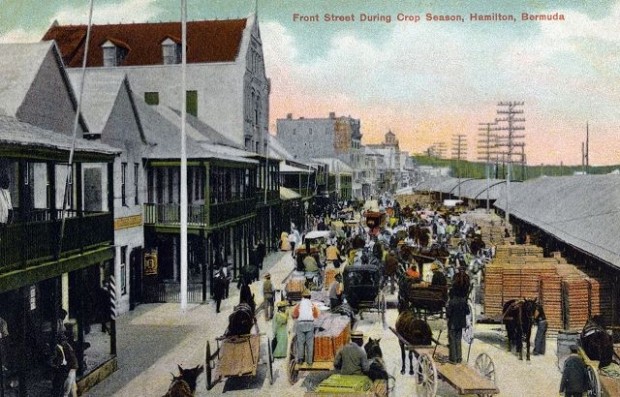Rise And Fall Of The Bermuda Onion
When Mark Twain visited Bermuda in 1877, he described the central role the island’s namesake onion had assumed in local life and culture by the late 19th century: “The onion is the pride and joy of Bermuda. It is her jewel, her gem of gems. In her conversation, her pulpit, her literature, it is her most frequent and eloquent figure.
“In Bermuda metaphor it stands for perfection — perfection absolute.
“The Bermudian weeping over the departed exhausts praise when he says, ‘He was an onion!’ The Bermudian extolling the living hero bankrupts applause when he says, ‘He is an onion!’ The Bermudian setting his son upon the stage of life to dare and do for himself climaxes all counsel, supplication, admonition, comprehends all ambition, when he says, ‘Be an onion’!”
Introduced to the island around 1616 and soon became a staple crop, the sweet and succulent Bermuda onions was first exported to the East Coast from St. George’s in 1847.
Onions quickly became Bermuda’s major export crop, with hundreds of farmers realising the market potential in the US and, later, the UK. By the middle of the 19th century Bermudians became known as “Onions” and Bermuda itself was widely referred to as “The Onion Patch”.
By the end of 19th century, major American vegetable importers looked to the island as a major source of onions and the ship SS “Trinidad” was carrying more than 30,000 boxes full of onions to the US on a weekly basis.
Front Street Clogged With Carriages Delivering Bermuda Onions To The Docks For Export
“There were times when over 4,000 tons of onions were shipped to the US,” said one historian writing of the onion trade. “The onion export from Bermuda continued for decades thereafter until the First World War [1914-18] when shipping almost came to a halt and thereby badly impacting the export of onions.
“Following World War One, although the onion export from Bermuda started again, the US imposed higher import duties slowing it down considerably. More over, by then a farmer community in the Texas started developing their own onions and even called them Bermuda Onions to sell and export them easily.
“Bermuda now had a fierce competitor to which it had to finally give up. The Texas farmers had the advantage of using North America’s new railway system to move and export their locally grown onions in bulk quantities.”
The historian concluded: “Bermuda being isolated on the North Atlantic, had to depend on shipping which was a far slower mode of transport. As a result Bermuda exports dropped from 153,000 crates in 1914 to just 21,570 crates in 1923. On the other hand, the Texas farmers were exporting over 1,000 railway carloads of onions to other countries and growing bigger. A farming community even called itself Bermuda Colony and later Bermuda, Texas.”
In the 1930s, Bermuda Trade Development Board tried desperately to curb the trend by sending postcards to their overseas buyers that stated: “It is the flavour of a genuine ‘Bermuda’ that is so different. Maybe it is the Sunshine and Sea Breezes down in beautiful Bermuda or some magic in the soil that is responsible, but whatever it is the flavor tells the difference immediately. Be careful then to always look for the crate… See that it is marked ‘from Bermuda Islands’ and you’ll know you are getting the real thing.”
But it was an exercise in futility. The era of Bermuda farmers exporting onions came to an end, with tourism replacing agriculture as the island’s economic mainstay.
However the nickname endures even if the industry which gave rise to it is long since extinct: in Bermuda metaphor, the term “onion” still stands for perfection — perfection absolute.
Read More About
Category: All, Environment, History
Comments (5)
Trackback URL | Comments RSS Feed
Articles that link to this one:
- Spotlight Bermuda: Onions | December 21, 2013
- Free Kindle Version Of Twain’s Bermuda Book | Bernews.com | July 11, 2014



The more things change the more they stay the same…
These historical notes are fascinating – keep them coming!
As we learn from history, great crops came from our fertile soil of Bermuda and there was a great export then and Bermuda can have the same great exports now. This is a new era and time as the world is yearning for the best of the best in crops of hemp and medical marijuana, ready to be exported to the lands of far… Bermuda can produce the best food oils, protein, paints, lighting oil, varnishes, paper, textiles, fabrics, rope, twine, art canvas,seasoning for foods, medicines in its natural and processed form, bio mass energy, smoking leisure tobacco, all this from one plant. Bermuda can possible change the world.
This would bring economic stability, profits and free trade for all… I know one thing for sure, it would certainly bring in the tourist, from all directions. Bermuda would be known around the world….
Can I get a A-men…
p.s. Maybe I’m thinking too far ahead of the times….